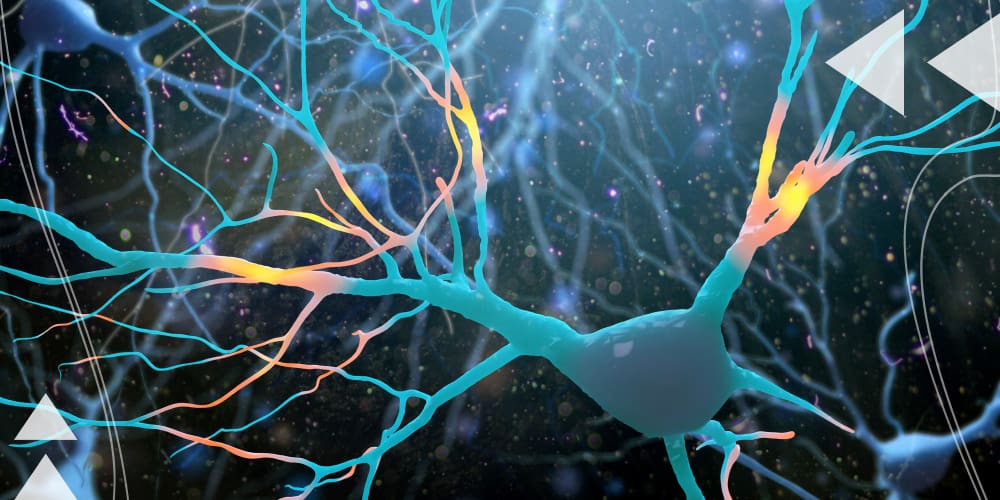Coronavirus outbreak caused by SARS‑CoV‑2 is a dangerous infectious disease with high passing capacity and an enhanced number of adverse effects. According to global statistical monitoring, almost 200 mln people worldwide have already been infected by the most harmful illness of the XXI century.
Although COVID-19 is famous for its mutation ability, the detected cases stress the following symptoms specifically attributed to SARS‑CoV‑2 and grouped into three categories:
- common signs: body temperature rise, dry cough, and fatigability;
- partial manifestations: various painful sensations, a sore throat, diarrhea, conjunctivitis, headache, loss of smell and taste perceptions, rash on the skin or depigmentation of nails on the hands and feet;
- severe symptoms: shortness of breath, a feeling of tightness or pain in the chest, impaired speech or motor functions.
The significant abnormalities in verbal, perceptive, or movement functions prove the crucial damage interfered with the human brain.
However, the relief and rehabilitation stage does not mean the complete abolition of the disease. The ex-patients often complain about abnormal CNS functionality, including various neurological disorders. In this case, epilepsy, Alzheimer’s disease, or Parkinson’s disease have a high probability of developing upon the COVID-19 overcome. Therefore, the ex-post coronavirus period requires the scheduled medical consultation and observation; in particular, the patients should investigate their mental health and appeal to the neurologists once the abnormal symptoms arise.
Nervous system effects during COVID-19 progress
The coronavirus contaminates the central nervous system in the same manner as the respiratory organs. The damage mechanisms for the brain and the nerves are various, and the researchers agree on three possible scenarios of the nervous system impacts.
- Firstly, there is a justified assumption that the respiratory system problems provoke the coronavirus mutations under the particular immune specifications and contribute to the pathological process inside the brain stem responsible for the inspiratory center activities. The infectious disease needs only five days to reach out for the first symptoms of respiratory failure.
- Secondly, the solid cause-effect relations between COVID-19 and the psychoneurological disorders are grounded on the coronavirus origin and its belonging to SARS viruses. The last ones are famous for their ability to penetrate neurons and cause direct inflammatory injuries.
- Finally, recent clinical trials detect the impact of SARS‑CoV‑2 on the immune system. The development of a cytokine storm during coronavirus infection increases the permeability of the blood-brain barrier, simplifying the access for viruses, bacteria, toxic metabolites, and inflammatory agents to the CNS structures without control. The impact of these factors on the brain tissue and its membranes can lead to the development of neurological symptoms without direct penetration of SARS‑CoV‑2. However, these conditions can still be considered associated with this infection.
The above-mentioned conditions complicate the healing process and confirm the perception problems at the initial stage of the ailment. Therefore, the treatment protocol should consider the comprehensive assessment of the basic health-supported specialists, particularly neurologists, to address the risks of modifying the psychoneurological disorders beforehand.
Post-coronavirus neurological symptoms
The post-coronavirus effects will interfere with the ex-patients for an extended period. This fact proves many cases fixed for the last two years and associated with severe neurological symptoms. The highly potential nervous system disturbances could refer to the following examples:
- Fatigue. The low energy level accompanies the patients from the very beginning of the COVID-19 infection. This infectious disease heavily influences both physical and mental health and deepens nervous system abnormalities such as depression, nerve crisis, insomnia, etc., which frequently require long-term treatment duration.
- Migraines. Acute or dull headaches are the results of serious damage to the brain core areas. There are also quite reliable theses about meningitis developed by the extended coronavirus effects.
- Cerebral crises and heart attacks. COVID-19 long-term reactions contribute to the chronic illnesses and pathologies occurring in the blood circulation environment. The damaged blood vessels in the brain and heart area are a delayed-time bomb that could activate in the future and gain tremendous adverse and even succumbed results.
- Epileptic seizures. The mental health disorders manifested as neurological symptoms upon the coronavirus remedy process are pretty harmful due to their modification abilities. Thus, some experts emphasize that the post-coronavirus stage could bring epilepsy-related symptoms among patients who have had some neurological disorders caused by this infectious disease.
- Alzheimer’s disease or Parkinson’s disease. These living-threatened ailments make life activities complicated and unbearable. The existence of such conditions could connect with the coronavirus effects soon.
So, to prevent the development of more sophisticated abnormal nervous system functionality cases, the COVID-19 recovered patients should periodically ask for the neurologist’s consultation and examination.











Please, leave your review
Write a comment: